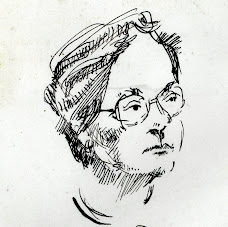This evening we watched King of Hearts (Le Roi de Coeur)(1966, US release 1967), starring Alan Bates and a lot of French actors. Although Wikipedia says that the French version was black and white and the color version was spoken in English (dubbed?), the version we saw was in color with subtitles except where Alan Bates and his comrades were speaking English.
It may seem surprising that I hadn't seen this film before, but I was quite impecunious in college and, looking at a list of films released in 1967, realized that the only one I'd seen at the time was Up the Down Staircase. Apparently it became a cult favorite in the US and ran for 5 years in Cambridge. The film is very 1967. First of all, I would say that it owes a lot to the Theatre of the Absurd.
The situation of a character who finds himself in an incomprehensible situation is a hallmark of this school of theater, and that is exactly what happens to Alan Bates as Charles Plumpick. Plumpick is a member of a Scots regiment in World War I, and his specialty is carrier pigeons (which in fact were used for communications in that war). Because he can speak French, he's assigned to defuse bombs that have been left behind in a French village by retreating German troops. In vain he protests that he knows nothing of munitions -- he has to go anyway. Arriving at the village, he is chased by German soldiers and hides in the local insane asylum; leaving there, he inadvertently leaves the door open. The inmates take over the town (which the usual inhabitants have evacuated) and crown Charles King of Hearts. He does manage to forestall the blowing up of the village.
Tragicomedy is said to be another hallmark of Theater of the Absurd, and it is definitely present in this film. While the general feel of the film is comedic, the body count is surprisingly high by the end of the film (although there is no mourning seen for those who die).
There are several themes in this movie that call back the prevailing mindset of 1967 (at least, of people who were going to movies in Cambridge, Mass.!) One of course is the feeling that the military is ipso facto ridiculous, foolish and incompetent. Yes, there are still people who believe this, but it was a much more prevalent attitude then. All the military men in King of Hearts, including Plumpick in his own way, fit this stereotype.
It seems to me that there was also a fascination with the mentally ill and specifically inhabitants of insane asylums (mental hospitals) around that time. During those years it seemed everyone was reading I Never Promised You a Rose Garden, Dibs in Search of Self, and David and Lisa (also a movie, made in 1962). The big story in Massachusetts was Frederick Wiseman's documentary Titicut Follies, shot in Bridgewater State Hospital, which the state successfully banned from public distribution until many years later. And another film that came out that year (which I plan to watch soon) was Marat/Sade (The Persecution and Assassination of Jean-Paul Marat as Performed by the Inmates of the Asylum of Charenton Under the Direction of the Marquis de Sade), which was based on a play by Absurdist playwright Peter Weiss. The thesis of King of Hearts, that the insane are the truly sane and the "normal" people are the madmen, seems to fit into the Absurdist point of view.
Furthermore, the inmates and Alan Bates as well, delight in costuming themselves to play various roles (General, Bishop, prostitute, Duke and Duchess, acrobat, King, etc.) Of course 1967 was the year of Sergeant Pepper's Lonely Hearts Club Band with the Beatles costumed on the cover; I recently read a book, David Lodge's Changing Places, set in 1969 where the "middle-aged" protagonist is bemused to find young men in Berkeley dressing as cowboys, Confederate soldiers, and so on. If I recall correctly, the use of costume to express oneself in everyday life was at its height in the latter part of the 1960s.
So, did I like this movie? Maybe. I really had no idea what to expect from the synopsis on the envelope, and I can't recall what made me add it to my queue in the first place. I think I was expecting something more like, oh, Whisky Galore, and instead I got Theater of the Absurd. It did hold my interest until the end and I enjoyed Alan Bates's performance. I guess I'll give it three stars.
Subscribe to:
Post Comments (Atom)


totally random, but I think that this is one of my sister's favorite movies.
ReplyDeleteI could see why this is someone's favorite film. Most people like works of art that make a very definite statement and do it competently. Add "oddball" to the description (and I use the term to connote "standing apart" rather than just "goofy," although a little goofiness is always welcome), and you have a winner.
ReplyDelete